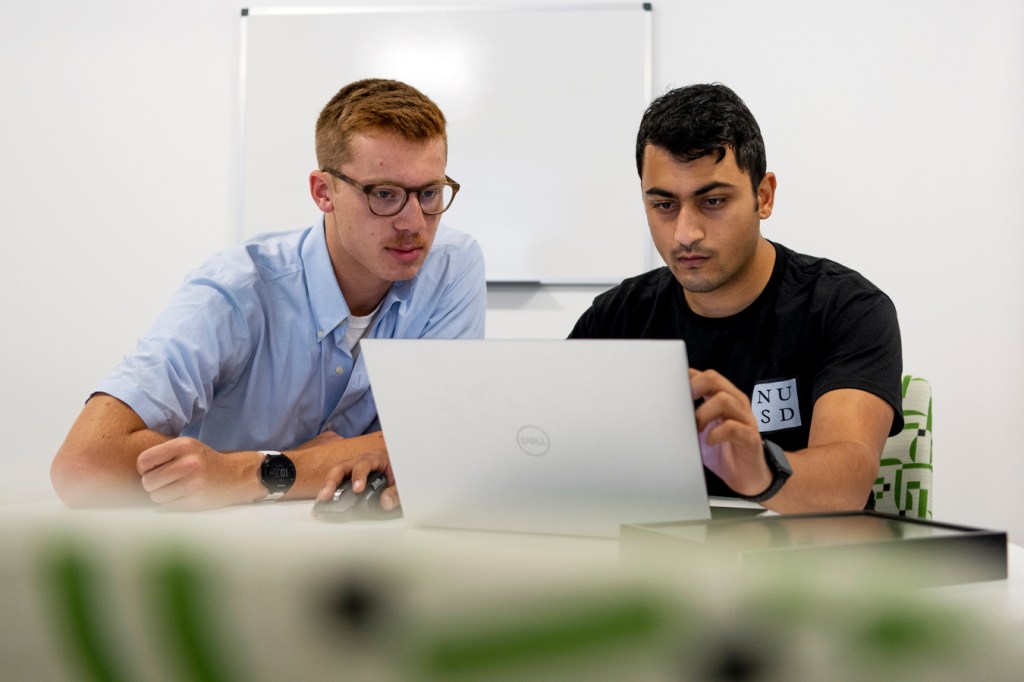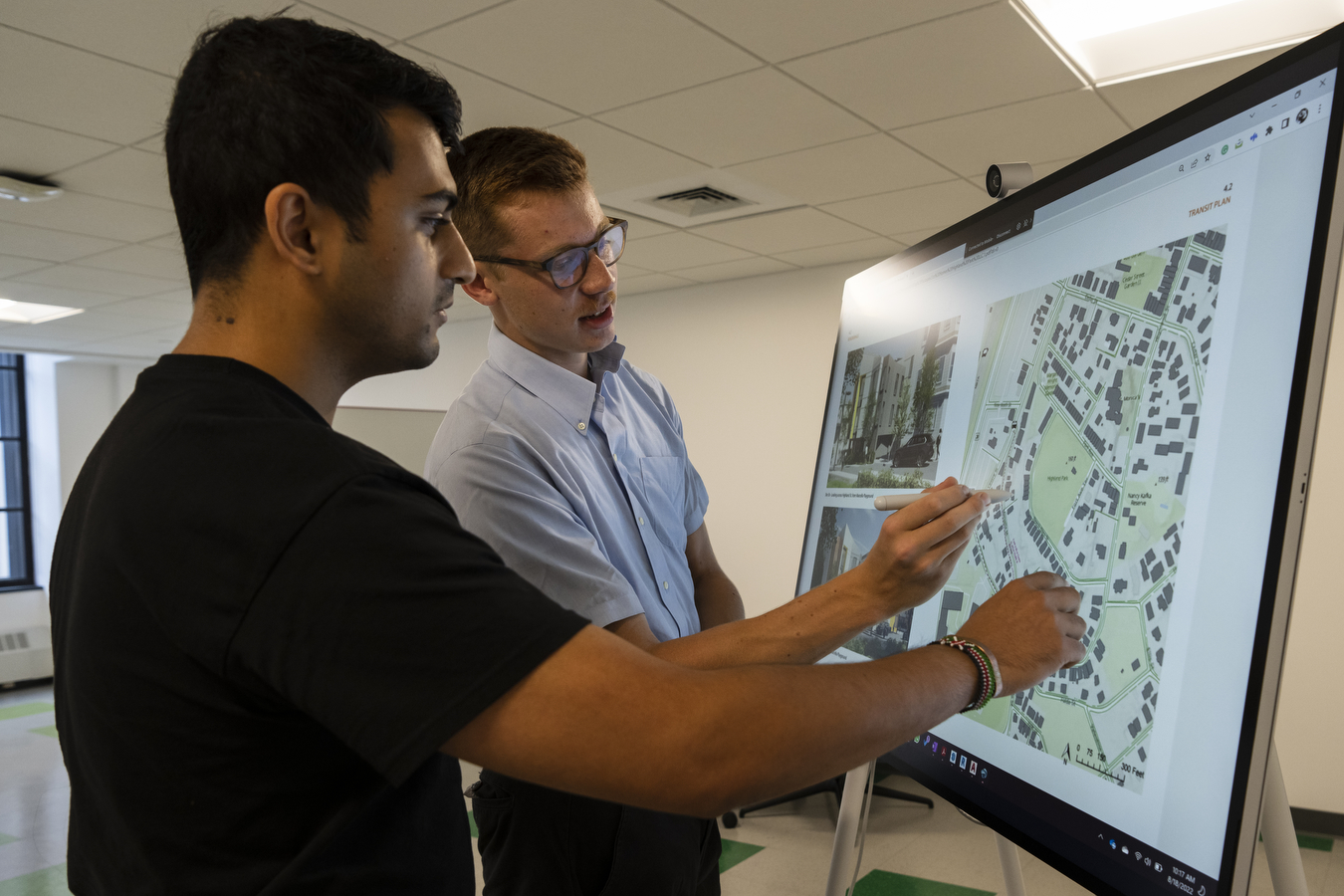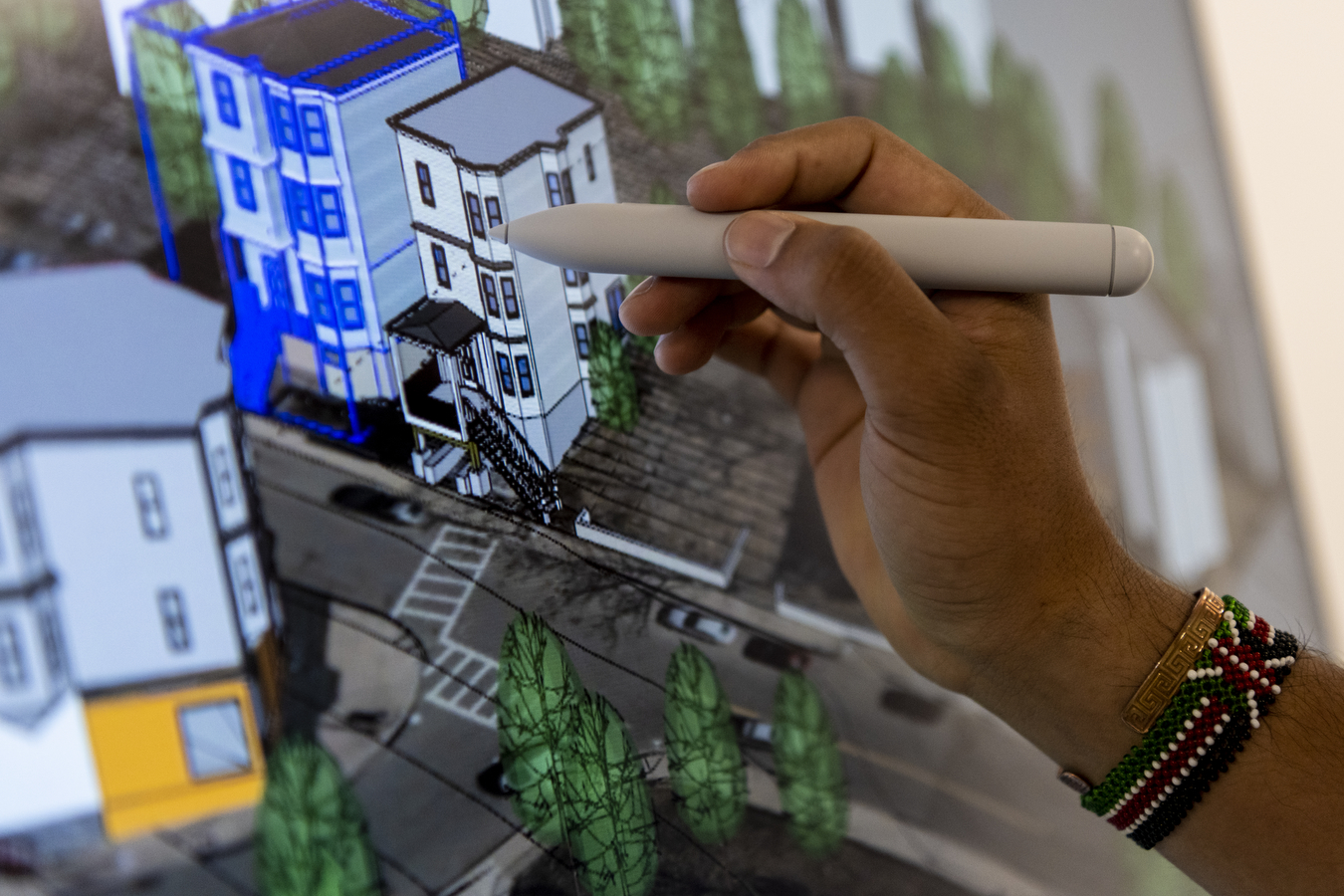Northeastern students go big with energy-efficient housing project in nearby Boston neighborhood

A collegiate Solar Decathlon Build Challenge team has never built a multi-unit, energy-efficient structure in a large city.
Northeastern University could be the first.
The team is working with a local developer, Urbanica, on a $10.6 million project to design and build 18 units of net-zero housing on two Highland Park neighborhood properties near the Boston campus. The area is also known as Fort Hill.
Northeastern students played an active role in the design of the energy-efficient, affordable housing project, according to Ted Walinskas, Northeastern Solar Decathlon team president and project lead. The plans were submitted to the city of Boston in response to a request for proposals for the two city-owned properties.
The students helped design structures with sustainable features, run energy models, formulate an LEED development plan, and integrate an energy-saving home automation system. The housing features roof lines that maximized solar gains, photovoltaic panels and solar thermal panels, high-performing insulated walls, clapboard cladding, and triple-insulated windows and doors. The team created site massings—3D models of buildings—and estimated LEED credit scores to meet energy performance goals, says Walinskas, a third-year student.

Five subgroups make up the Northeastern solar decathlon team: architecture; structural systems; mechanical, electrical and plumbing, and energy systems; landscape; and home automation. The subgroups, Walinskas says, contributed to the design plans and submitted RFP.
The project is called Eco Homes at Highland Park and includes parcels on Highland and Marcella streets. Urbanica, along with the Northeastern Solar Decathlon team, submitted a proposal to the city of Boston in May and is set to begin the city review process.
The team wanted to do more than the Solar Decathlon Build Challenge required, which is to design and build a functional, energy-efficient housing unit. Aiming to make an impact in the local community, team members sought to tackle not only net-zero energy efficiency but also affordable housing. So they went looking for a partner and quickly found one in Urbanica, a developer in Roxbury that has done several energy-efficient, affordable housing projects in the city, including some in the Fort Hill neighborhood.
“Urbanica said they’d be happy to work with us on the project. They do a lot of developments around the city, they do a lot within Highland Park,” Walinskas says. “They really liked the idea of having students work with them on the project, especially as a community element, because we have another community partner, the Highland Park Land Trust, so having this kind of three-way connection with the developer, a community organization and a group of students from a nearby university is sort of a good triangle.”
Solar Decathlon academic adviser Michael Kane, Northeastern assistant professor of civil and environmental engineering, says the team was “really motivated” not only to build an energy efficient house, but multiple units that were affordable. However, that is difficult in a city the size of Boston, he says, so they had to connect with a developer that was willing to work with them.

“This time they did something huge,” Kane says. “It’s an excellent opportunity for the students to work with a developer and build their skills.”
Michael Young, technical project manager for National Renewable Energy Laboratory in the U.S. Department of Energy, which runs the Solar Decathlon Build Challenge, agreed.
“Northeastern is pursuing a really aggressive project. They want to solve a problem they see in the area. I think that’s a really admirable goal for this team,” Young says.
Young says most of the projects in the competition are single-family units, one is a duplex but the submission only includes one side of the building.
“In that aspect, the project really does stand out to me. I’m excited to see the project get done,” Young says.
“From my experience, it’s the largest scale I’ve seen that is quite unprecedented, in my experience. It really is unprecedented and it’s exciting to see they’re doing that,” Young says.
The project includes buildings on two lots. There are essentially two modern three-deckers with a shared wall at 75 Marcella St. with a total of eight units: six three-bedroom units and two two-bedroom units. The other site includes frontage at 255 Highland St. and 84 Marcella St., with 10 units: eight three-bedroom units in a townhouse building facing Marcella and two three-bedroom units facing Highland Street.
Kamran Zahedi, president and founder of Urbanica, says his company has built more than 100 units of energy-efficient, affordable housing in Roxbury, Jamaica Plan and Allston over the years. The Northeastern students, he says, brought a lot of new ideas to the project.
“They have done extensive studies on the latest techniques and energy efficiency. We asked them to come up with some designs on how we can make them energy efficient,” Zahedi says. “It’s actually beneficial to both parties.”
Northeastern team members, led by Walinskas, have spent many hours working at the site and on their computers. Utilizing a basic floor plan and an energy load profile, the students tapped the expertise of professors and used special computer programs, such as SketchUp, Ekotrope and Revit, to create the highest high energy efficiency rating of LEED platinum.
Natali Rabichev, lead for the landscape subgroup, said the main goal of her group has been developing stormwater management and drainage plans, controlling invasive species in the area, and designing plant schemes with drought resistant species.
“Our goal through all this was to be affordable housing and be energy efficient. I think the two go hand in hand,” says Rabichev, a third-year student majoring in environmental engineering and landscape architecture. “We’re trying to have an impact in our community. That’s important to me and a lot of students.”
The competition is a two-year event, the current one concludes in 2023. However, if the project is approved by the city, it will be lucky if it can even start construction by 2023. The competition requires projects to be designed and completed within a two-year cycle, which means it must be completed in 2023. Therefore, the Northeastern team cannot meet all the requirements of the build challenge.
According to competition rules, “Teams will compete to earn points by operating their house successfully, and by showcasing the excellence of their solutions to industry expert jurors.”
The team has three options, it can simply enter the project in the Solar Decathlon Design Challenge, which does not require building the housing; resubmit the project for the 2025 Build Challenge; or participate in the 2023 Build Challenge as exhibition only. The team is still considering the options, Walinskas says.
The Eco Homes at Highland Park project application is under review by the city Boston housing office and a developer community presentation will be scheduled in the fall, according to Alexander Sturke, director of communications for the Mayor’s Office of Housing. A 14-day comment period will be held after the community presentation and then the housing office will make developer recommendation.
“It is uncommon for a sponsor such as the NU Solar team to participate in a tangible development, in this case responding with a team on a request for proposals,” Sturke says. “… It is rare for a team to go beyond the hypothetical and partner with a developer and propose a plan and be prepared to advance the plan.”
For media inquiries, please contact media@northeastern.edu.





